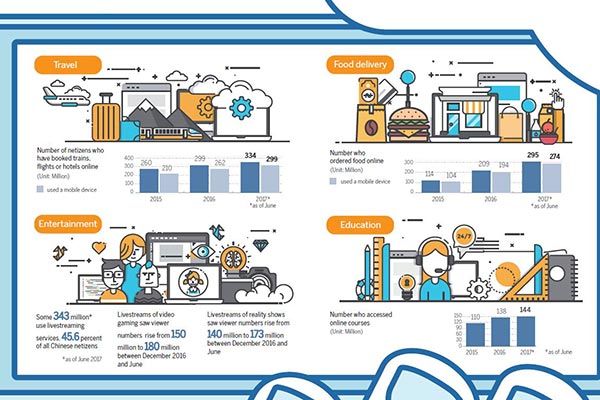Connection to the web helps relieve poverty
JD.com Inc, China's second-largest e-commerce player, has been helping villagers in poverty-stricken areas since 2016 with multiple measures, said Liu Qiangdong, CEO of the company.
As part of the measures, JD gives newly hatched chicks to villagers in some poor areas.
"Equipped with a monitoring device, each chick should have walked 1 million steps before they can be sold on JD.com," said Liu, adding that chicken raised in such a way can be priced more than six times higher than those raised in cages.
He made the remarks in a speech at a forum themed "Sharing internet dividends for poverty alleviation", as part of the 4th World Internet Conference.
Entrepreneurs and officials participating in the forum agreed that internet technologies and e-commerce can make an increasing contribution to the poverty alleviation campaign.
Li Jun, 32, Party secretary of Xiuyun, a village in Sichuan province, said the village has opened some popular restaurants in provincial capital Chengdu, with food produced by the villagers on their own land.
"For example, the chicken served at our restaurants is priced according to their age rather than its weight," said Li, adding that the practice is aimed at avoiding the use of unhealthy foodstuffs for faster growth.
Customers who are content with the food will very often register on their own e-commerce platform by scanning QR codes in the restaurants, he said.
Beijing Spruce World Technology, which owns meicai.cn, an e-commerce platform for organic food, has been contributing to poverty alleviation by contracting with the villagers for the latter's products, according to Liu Chuanjun, chief executive officer of the company.
"Orders from e-commerce platforms help the villagers avoid market risks," said Liu.
Tang Ke, head of the market and economic information department at the Ministry of Agriculture, said featured industries in the agriculture sector accounted for 68 percent of the turnover by the end of 2016, up from 52 percent in 2012.
China's economic development is unbalanced and connectivity to the internet is essential to solving the problem. The Ministry of Agriculture is working on a project in 10 provinces to establish at least one internet service station in each village, said Tang.
Connectivity means not only infrastructure, but also the knowledge of using the internet, since many of the poverty-stricken villagers don't know how to use it, said Li Jun of Xiuyun village.
Since 2012, more than 7 million people who were previously employed in cities have returned to their rural hometowns to start their own businesses.
With more young and better educated people returning, the popularity of the internet in rural areas would greatly help poverty alleviation, Tang said.

























